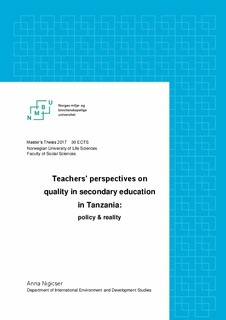| dc.description.abstract | Education can be a catalyst of both economic and social development. In recent years, great progress has been achieved in broadening access to primary education in developing countries, such as Tanzania. However, less attention has been payed to the secondary level of education and increased enrolment have had a negative impact on the quality of education. Thus, Tanzanian education policies set out to improve the quality of education where investing in teachers, as key facilitators of quality education, is among the priorities. Therefore, in the light of quality defined in educational policies, this study investigated teachers’ own perceptions and practices about providing quality education in secondary schools in Tanzania as well as how teachers’ perceptions are formed the teacher training they have received. The study applied a range of qualitative research methods in a case study design to investigate the issue of quality. Interviews and observations were carried out in a government, a private day and a private boarding secondary school in Tanga City to examine reveal the constrains and potentials of providing quality in different physical and economic environment.
Findings of this study revealed that teachers’ perceptions of quality are rather diverse. More difference was found in perceptions based on teachers’ age rather than between private and government schools. Findings of this study also indicate the implications of putting the objectives of education policies into practice considering the under-resourced school environment and poor working conditions for teachers especially in government school. In addition, internalizing the way of thinking behind methods and ideals taught at teacher training colleges proved to be rather challenging due to the cultural embeddedness of quality in education. If teachers as key facilitators of quality education cannot with identifying themselves with the complex and often changing priorities and ideals of education policies, it is questionable to what extent the policy objectives are met in practice and whether learners can in real sense benefit from the knowledge and skills acquired in schools to achieve their valued goals in life. In order to improve the quality of education, Tanzania needs to define a clear vision and values for education that guides priorities in resource allocation was well as teacher training. | nb_NO |

